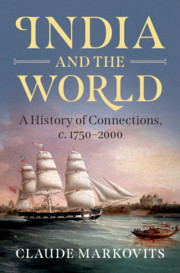Book contents
- India and the World
- India and the World
- Copyright page
- Dedication
- Contents
- Figures
- Tables
- Acknowledgements
- Chronology
- Glossary
- Abbreviations
- Map of India’s Global Connections, 1750–2000
- Introduction
- 1 India in the Global Economy
- 2 India in Global Human Circulations
- 3 India in the World of Wars and Peace
- 4 India in the Global Exchange of Ideas
- 5 India in Global Cultural Circulations
- 6 Indians and Others
- 7 Two Global Indian Events
- Conclusion
- Bibliography
- Index
4 - India in the Global Exchange of Ideas
Published online by Cambridge University Press: 19 March 2021
- India and the World
- India and the World
- Copyright page
- Dedication
- Contents
- Figures
- Tables
- Acknowledgements
- Chronology
- Glossary
- Abbreviations
- Map of India’s Global Connections, 1750–2000
- Introduction
- 1 India in the Global Economy
- 2 India in Global Human Circulations
- 3 India in the World of Wars and Peace
- 4 India in the Global Exchange of Ideas
- 5 India in Global Cultural Circulations
- 6 Indians and Others
- 7 Two Global Indian Events
- Conclusion
- Bibliography
- Index
Summary
I focus on the traffic in ideas between India and the rest of the world, covering religion, science and political ideas. India’s contribution to the global religious field was significant. While attempts at making Hinduism a ‘world religion’ were not uniformly successful, the circulation of the Hindu scriptures did impact the intellectual history of Europe and North America, contributing to a critique of the Enlightenment. Indian Islam was a major contributor to Islamic reformism, modernist as well as fundamentalist, and some major transnational Islamic movements had their origins in India. Indian Christianity recently acquired a significant global dimension, while India again became part of the world of Buddhism. I evoke India’s contribution to science through the scientists of world stature it produced. I also deal with how global ideologies such as liberalism, communism and fascism were appropriated in India in ways that were often profoundly original. I draw attention to the long-term success of the Indian version of fascism represented by the RSS and the BJP and present a study of Gandhi’s global impact. Finally, I look at the globally influential Subaltern Studies collective.
- Type
- Chapter
- Information
- India and the WorldA History of Connections, c. 1750–2000, pp. 117 - 150Publisher: Cambridge University PressPrint publication year: 2021

